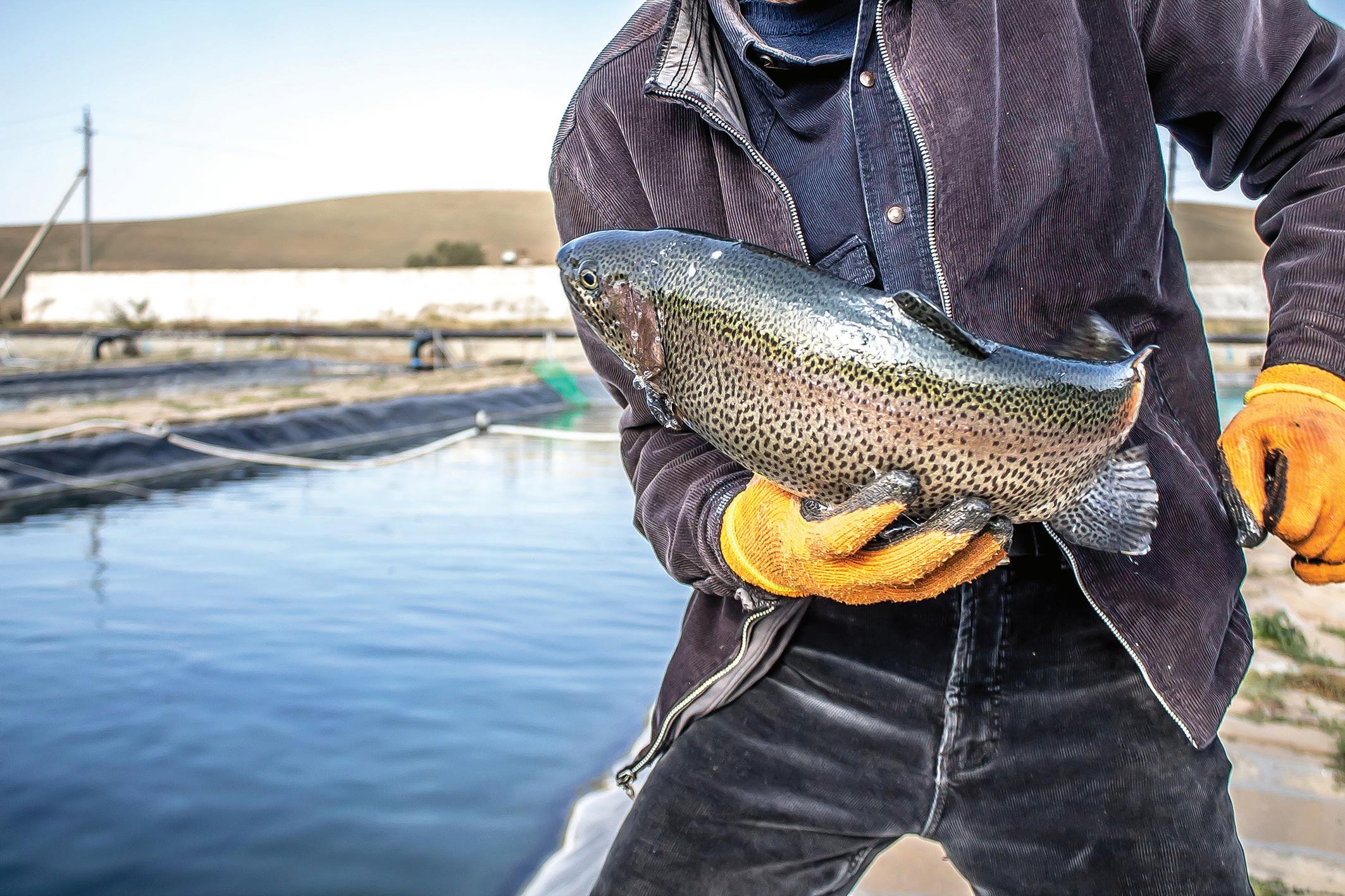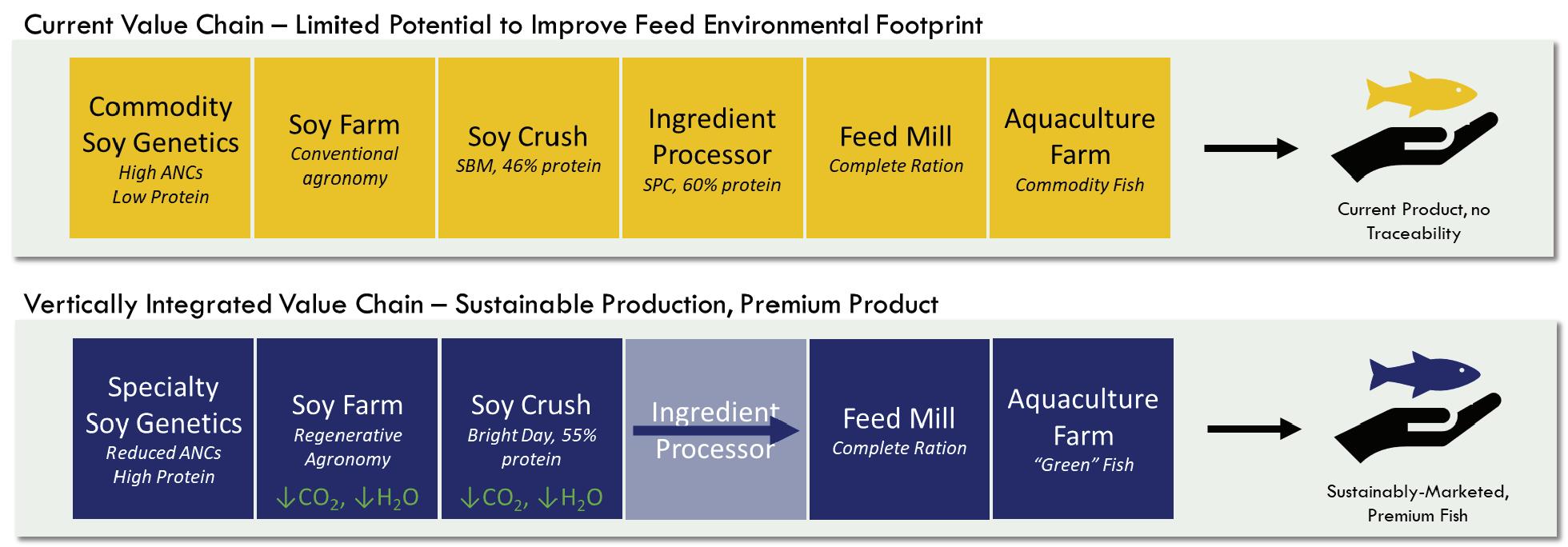
5 minute read
Better from the beginning: Using plant genetics and value chain integration to provide functional and sustainable soy ingredients for aquaculture rations
Dan Northrup, Hannah Lucas, Benson Hill
Just as aquaculture is critical to sustainably nourish the world’s population, aquaculture feed is vital to produce a nutritious and environmentally sustainable product. Salmon, trout and other marine finfish have traditionally relied on feed ingredients such as fishmeal and plant protein concentrates to achieve high protein and fat requirements and avoid diseases such as enteritis – an inflammatory condition of the gut caused by anti-nutritional factors present in soybeans*. These legacy plant protein concentrates are created
Advertisement
Table 1. Feed conversion results in Bright Day™ feeding trials*.

Table 2. Typical values for Bright Day specialty soy meals (as-is).
from commodity, high-yielding soy crop varieties which were developed to service the scale needed for livestock feeds, not aquaculture. That doesn’t have to be the case. In the same way we can tap the genetic diversity of plants to optimize harvest quality, disease resistance, and yields, today we can leverage tools such as AI and predictive breeding to design a soybean that better meets the dietary needs of aquaculture rations.
Better from the beginning
The natural genetic diversity of plants offers a host of options to create ingredients that can enter rations with minimal processing – lending a more sustainable profile while simultaneously lowering production costs. We like to think of this as letting mother nature do the upfront work. Benson Hill is commercializing soy varieties with elevated protein content (HP), and varieties with ultra-high protein content (UHP) and very low levels of oligosaccharides. Ingredients derived from these soy varieties are intended to function as an alternative product to soy protein concentrate (SPC). The high protein, low anti-nutrient trait package has been tested in several aquaculture species including trout, pacific white shrimp, yellowtail and cobia. In all studies to date, meals provided comparable protein function to SPC without causing disease (Table 1)*. Benson Hill is actively testing new material in trout and salmon and welcomes inquiries about testing in new species. Specialty soybean meals are now offered under the Bright Day™ brand as a fully defatted hexane-extracted product (<1% fat), or as an expeller-pressed product (5% fat) (Table 2). With continuous improvement of the genetics and custom agronomic practice, Bright Day™ protein levels now reach as high as 58% on an as-is basis.
Industry adoption
Riverence is a vertically integrated family of farms producing steelhead trout in the pacific northwest United States. Rangen Feeds, a manufacturer of salmon, trout and shrimp feeds located in Buhl, Idaho uses Bright Day™ as a protein and fat source in Riverence diets. “Maintaining a high standard of quality to the customer’s plate requires continued focus on fish diet and nutrition. Benson Hill’s ingredients function well in our diets and are aligned with our sustainability strategy,” said Jason Mann, Director of Nutrition for Riverence. “Partnering with companies like Riverence and Benson Hill, who share our vision for sustainable growth of US aquaculture, results in efficiencies, value and healthy sources of protein for consumers. High quality, domestic ingredient sources play a big role in achieving this,” noted David Brock, Nutritionist for Rangen Feeds.
Sustainability spotlight: Processing
Aquaculture’s nutrition density and feed conversion efficiency make the industry a strong sustainability story from the start, with the potential to do even more to enhance its positive environmental impacts. Feed is a major component of the environmental footprint of a farmed fish, making it an attractive target for improved stewardship. The ability to eliminate processing steps means less energy and water is required to produce the end product, inherently improving the sustainability profile of Benson Hill’s ingredients. In a life-cycle assessment comparing UHP Bright Day™ meals to Brazilian-sourced SPC, the ingredient was found to


Figure 1. An Integrated approach to higher quality, more sustainable feed and fish.
require up to 70% less water and up to 50% less CO2 per kg of product*. All grain is produced in North America, where there is little risk of deforestation or land conversion.
A large portion of the environmental footprint of feed comes from crop production practices. A lack of traceability in existing commodity supply chains means that aquaculture producers are limited in their ability to drive improved management practices on specific farms. In contrast, identity-preserved supply chains have increased potential to change on-farm management practices especially in a closed loop or integrated models. Higher levels of traceability enable direct tracking of farm production practices.
Through partnership with soy growers, the adoption of on-farm technology and agronomic practices can be promoted to further sequester carbon within the supply chain. As aquaculture farmers promote land and water stewardship on their own farms, sourcing through companies like Benson Hill enables the expression of the same values at the beginning of their supply chain.
Sustainable, high-quality protein options are needed to enable aquaculture’s continued growth. Crop genetics have the potential to help meet this demand, directly generating attributes that are commonly achieved through grain processing. The high protein, low oligosaccharide trait package was designed with aquaculture in mind, and Benson Hill is developing additional traits to further customize the genetics. Through collaboration, we can support the sustainable growth of the aquaculture industry through protein ingredient innovation.
Benson Hill, Inc. moves food forward with the CropOS® platform, a cutting-edge food innovation engine that combines data science and machine learning with biology and genetics. The company empowers innovators to unlock nature’s genetic diversity from plant to plate, with the purpose of creating healthier, great-tasting food and ingredient options that are both widely accessible and sustainable. More information about Bright Day™ can be found at brightdayfeed.com.
*References available on request.
More information: Dan Northrup, PhD
Director, Special Projects Benson Hill, USA E: dnorthrup@bensonhill.com
Hannah Lucas
Manager, Business Development Benson Hill, USA E: hlucas@bensonhill.com










